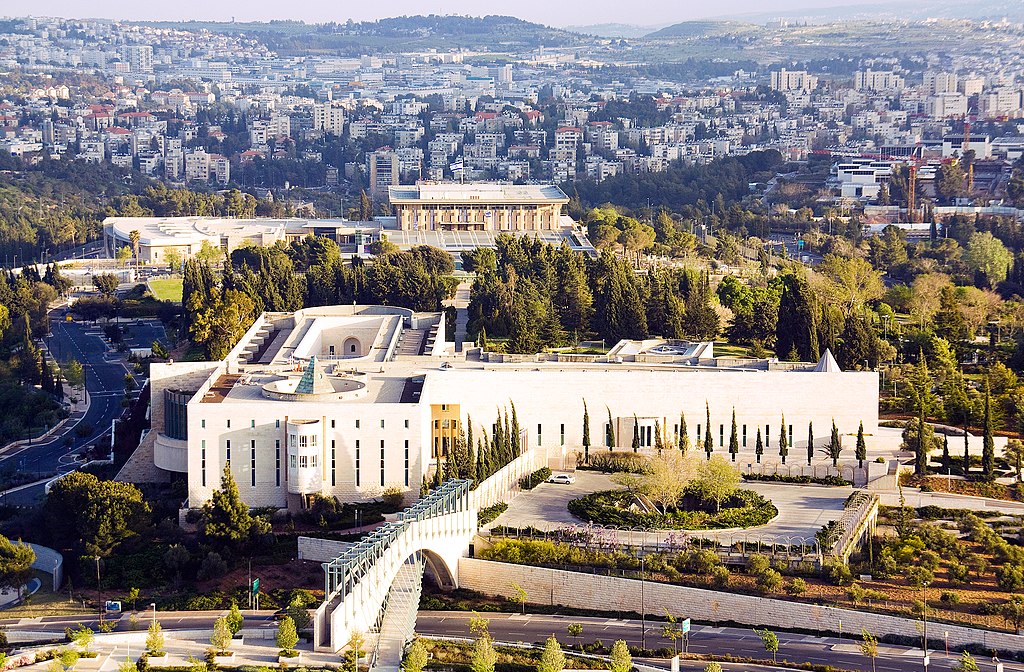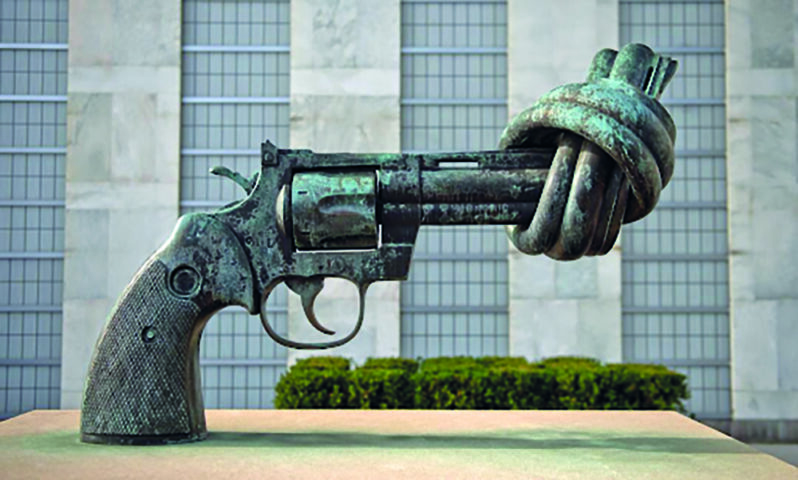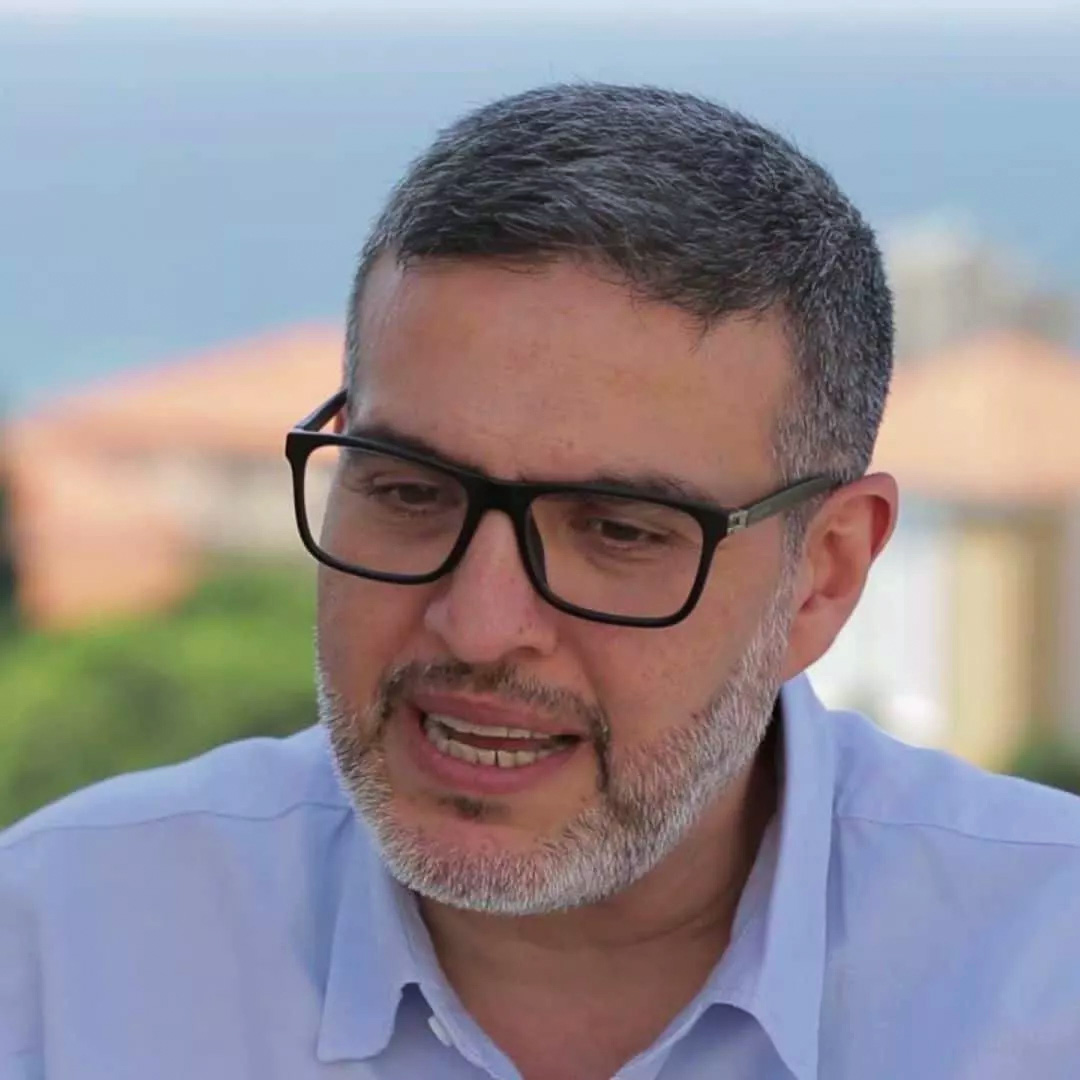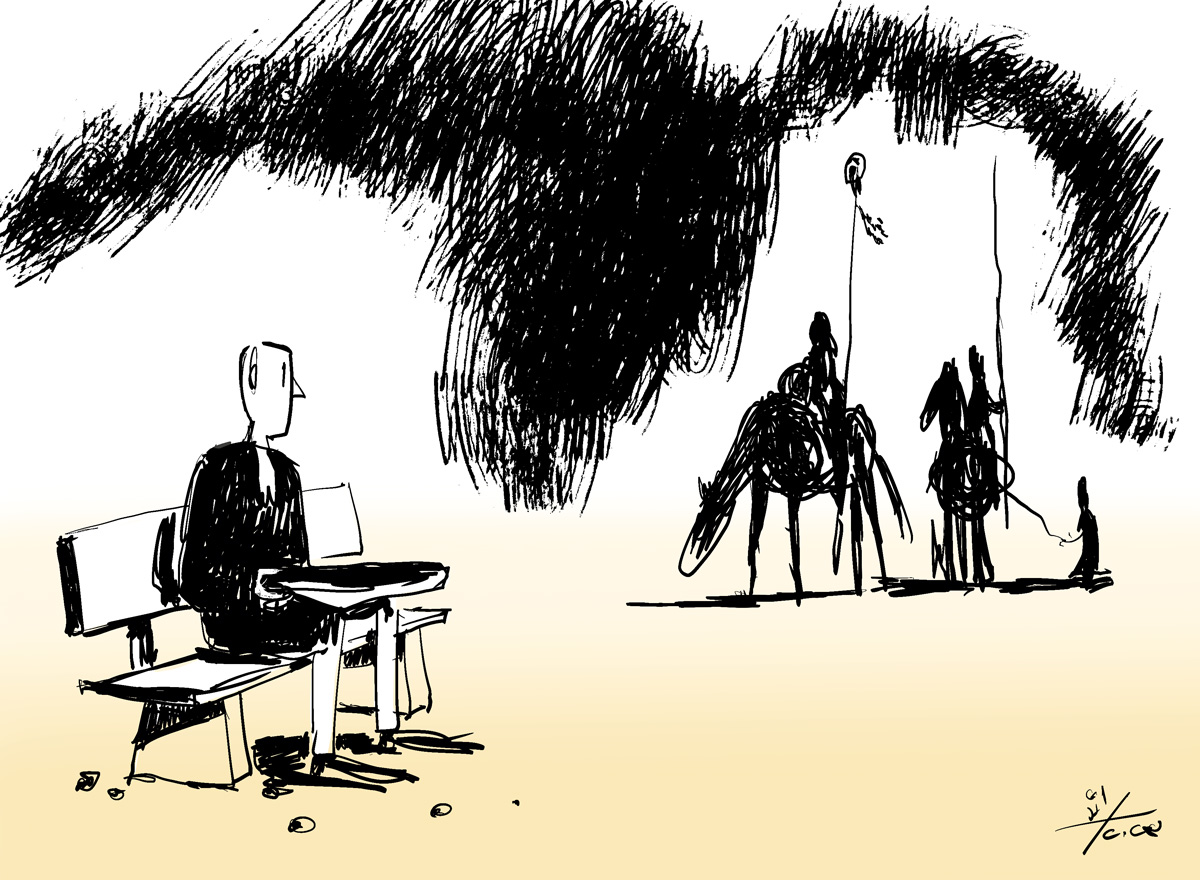Israeli Judicial Reforms: Bursting the Bubble of a Colonial Court System

On 4 January 2023, less than a week before the current Israeli government was sworn in, Justice Minister Yariv Levin announced a controversial overhaul of the judicial system. What became known as the Levin Plan comprises several technical and legal changes, but the essence of the proposed reforms lay in constraining the influence of the Israeli Supreme Court while enhancing the authority of the Knesset to pass laws with less hurdles.[1] If adopted, they would significantly tilt the balance of power towards government and away from the judicial branches. While in the past the Supreme Court could strike down certain laws passed in the Knesset when they conflicted with one of Israel’s Basic Laws, the proposed reforms would reduce the Court’s oversight and further empower the government.
Since Levin’s announcement, mass demonstrations have rocked Israel with protesters lamenting the country’s supposed authoritarian turn. Prime Minister Benjamin Netanyahu was accused of a glaring conflict of interest because the legal reforms would give him the chance to obtain parliamentary immunity from his ongoing trial for corruption, something he has been trying to push at least since early 2020.[2] The new government is also billed as “the most far-right in Israel’s history,” given that along with Netanyahu’s Likud, the ruling coalition comprises Itamar Ben-Gvir’s Jewish Power Party and Bezalel Smotrich’s Religious Zionist Party, both of whom are ultra-nationalist West Bank settlers with a known past of inciting racial violence against Palestinians.[3]
Against this background, the Israeli protests seem to pit the liberal camp as the protector of the “rule of law” against the rise of an unprecedented and extremist far-right. This is the common story told by many international commentators observing the demonstrations and debating the future of Israel’s “democracy.” Yet, a closer look reveals that defending the Supreme Court is far from a democratic or anti-authoritarian position. Law in general, and the Court in particular, should be situated within their relevant historical and political context, which in this case is Israeli settler colonialism.[4] If observers centered Palestinians in the debate, the Supreme Court’s record clearly shows it has consistently provided support for Israeli practices of colonization and military violence.
What the Israeli Supreme Court Means for Palestinians
From the standpoint of the colonized, leadership of the Zionist colonial project – whether right-wing or left-wing – matters little. It was the dominant, ostensibly left, Labour Zionism of David Ben-Gurion in 1948 that carried out the ethnic cleansing of over 750,000 natives, what Arabs and Palestinians call the Nakba (catastrophe), to usher in the settler state of Israel. Commenting on the Israeli “pro-democracy” demonstrators hailing from that political tradition, historian Ilan Pappé writes that “[t]heir liberal Zionism is founded on a series of oxymorons: Israel as an enlightened occupier, a benevolent ethnic cleanser, a progressive apartheid state.”[5] He adds that Israeli military officials, “who have committed countless war crimes in the Gaza Strip, and before that in the West Bank and Lebanon, are now playing a crucial role in the emerging opposition bloc.”[6] They fear that undermining the Supreme Court through judicial reforms would contribute to Israel becoming a global pariah, as apartheid South Africa once did, and lose its legitimacy as a liberal and democratic state.
The Israeli Supreme Court holds two main functions: acting as a court of appeal and serving as a High Court of Justice.[7] It is in the latter function that the Court gained wide public support. Israel’s highest judicial branch gained prominence also for reviewing the actions of the government and military inside Palestine’s 1967 Occupied Territories (OT). Yet its record in the OT is telling of its undemocratic and colonial nature. The Court has authority over areas under military occupation, where roughly five million Palestinians reside without citizenship rights in the state from which the judicial branch emanates. It thus legislates over non-citizen occupied subjects; Palestinians are bound by the colonizer’s law but are not granted political rights. The Supreme Court, then, does not even recognize the Israeli regime’s control of the West Bank and Gaza Strip as an occupation but accepts the state’s position that the territories are “disputed.” The established consensus under international law is that the territories are occupied, yet the Israeli state has only acknowledged that it would respect the “humanitarian provisions” of the Geneva Conventions.
A contemporary example of the Supreme Court sanctioning Israeli military violence was during the 2018-19 Great March of Return. When Palestinians organized a series of peaceful protests along the fence enclosing the Gaza Strip – to demand an end to the siege ongoing since 2007, and to return to their lands and homes from which they were dispossessed in 1948 – the Israeli army responded with snipers shooting to kill and injure civilians, as well as journalists and medics.[8] To end the marches, the Israeli army killed 214 Palestinians and injured over 36,100 – of those injured over 8,000 were hit by live ammunition.[9] One month into the series of demonstrations that lasted almost two years, the Supreme Court could have restrained the targeting of unarmed protesters. But when human rights NGOs petitioned to review the snipers’ open-fire policy, the Court rejected the petitions and sided with the Israeli army’s conduct.
The Supreme Court has authorised a range of violent state practices such as, inter alia, the denial of family unification[10] and the use of torture.[11] The Court has also blocked any petitions to challenge the indefinite incarceration of Palestinians without trial.[12] In 2019, the Court also approved Israel’s draconian policy of withholding the bodies of killed Palestinians.[13] For decades the Israeli regime has mobilized this necropolitical measure of withholding the bodies of dead Palestinians – some of whom are held in the Greenberg Institute of Forensic Medicine, an affiliate of Tel Aviv University – as “bargaining chips” to coerce concessions during negotiations or in potential prisoner swap deals.[14]
On the matter of colonial expansion, the Supreme Court is an enabler of Palestinian dispossession. Masafer Yatta has become the latest high-profile target of the Israeli occupation in Area C of the West Bank. A total of 1,200 Palestinians are set to be forcibly expelled from the south of Hebron; an area Israeli settlers have long sought to colonize. In May 2022, the Court rejected appeals against pending eviction orders on the Masafer Yatta community, and essentially accepted the Israeli state’s argument that the land is a closed military training site which the indigenous Palestinian inhabitants have no right to live on.[15]
In effect, the Supreme Court recognizes the state’s definition as “Jewish and democratic,” and further asserts that this definition entails maintaining a Jewish majority in Israel.[16] One intended effect of this is to preclude the possibility any return of Palestinian refugees with a claim to homes and lands inside the boundaries of the Israeli state. The definition also casted ‘48 Palestinians (known as Palestinian citizens of Israel), leading to decades of discrimination. Historically, the Israeli state has designated them as second class citizens, but often they are subjected to the same colonial practices and military repression directed at other constituencies with nominally less rights enshrined in law.
Extending citizenship to Palestinians who stayed put and were not expelled in 1948 was a necessary compromise to receive liberal, international recognition for Israel’s new settler state sovereignty.[17] Citizenship, however, never meant full equality under a state founded on racial hierarchies, whereby Jews hold a supremacist status over Palestinian Arabs. In 2021, the Supreme Court reaffirmed the legality of Israel’s racialization of Palestinians by upholding the constitutionality of the 2018 Nation-State Law. According to Adalah (The Legal Center for Arab Minority Rights in Israel) the law enshrines “Jewish supremacy over Palestinian citizens” and “has distinct apartheid characteristics and requires racist acts as a constitutional value.”[18] For scholar Lana Tatour, the Nation-State Law merely “affirms reality” as experienced by Palestinians: decades of occupation, apartheid and colonization.[19]
In 2022, the Supreme Court further upheld a 2008 amendment to the 1952 Citizenship Law that permits the stripping of citizenship from ‘48 Palestinians accused of a “breach of loyalty” – a broadly defined construct through which Palestinians accused of “terrorism” face deportation.[20] In 2021, under a similar pretext, Palestinian Jerusalemite Salah Hammouri had his residency rights revoked.[21] Through an amendment to the Entry into Israel Law passed in 2018, the Interior Ministry revoked his Jerusalem ID and permanent residency status.[22] Hammouri was first held under administrative detention and accused of “terrorism” for his human rights work with the Palestinian NGO Addameer, a prisoners’ aid center that was criminalized as a “terrorist organization” along with five other Palestinian rights groups. After Israel’s Supreme Court rejected an appeal against the decision to revoke his residency rights on alleged “breach of loyalty,” Hammouri was expelled from his homeland.[23]
The Limited Emancipatory Potential of Defending the Supreme Court
Despite the clear record of sanctioning state violence meted out to Palestinians, the Supreme Court has become a highly popular institution. By allowing petitions from politicians and civil society to challenge the legality of government policy, it became a key site for political contestation and public debate. It is also predominantly seen as an “activist” Court – both in a positive and negative connotation.[24] It is often the Zionist religious-right camp that criticizes the Court for hindering their expansionist settler project. Part of the “activist” label came from certain judicial reviews which occasionally rule in favor of petitioners seeking to protect Palestinians. For a recent example, in April 2023, the Court ruled against an attempt by Israeli settlers to expel a Palestinian family from their home in the Silwan area of East Jerusalem.[25]
However, the Supreme Court refuses to deal with structural issues of injustice. The matter of the legality of colonies, checkpoints, and the separation wall are all deemed general questions the Court refuses to consider. Instead, it allows for scrutinizing only a singular element: a single colony or checkpoint or partial route of the wall.[26] It thus obscures the historical and political context in which these matters are situated. Through these kinds of legal and discursive moves, the Supreme Court – as legal scholar Nimer Sultany points out – effectively legitimates Israel’s colonial occupation. It may intervene to push back against Israel’s worst violent excesses but overall leaves the colonial project unscathed. Sultany concludes that there is “no reason for the colonized to have faith in the colonial rule of law institutions.”[27]
Some Palestinian organizations still see value in “legal resistance” through the Israeli judicial system, although they are aware that their oppressors’ courts are unlikely to bring any true measure of justice or liberation. Palestinian lawyer Hassan Jabareen, one of Adalah’s founders, argued that petitioning the Supreme Court hardly ever provides a domestic legal remedy for Palestinian victims. Where petitioning can succeed is in mobilizing tools that transcend the function of domestic courts. Drawing on cases filed during the Al-Aqsa Intifada (2000-2005), he suggests that petitions had two main positive effects: to create a historical record of events that work against attempts to suppress coverage of the Israeli army’s operations; and to rally international support, e.g. at the United Nations or in international courts, by anchoring petitions in the principles of international law.[28]
Yet supporters of the Supreme Court use its work as proof of a lawful and orderly form of Israeli rule. To defend its conduct against Palestinians in the OT, the Israeli regime habitually refers to decisions of the Court as evidence of “protecting the rights of the local population.”[29] Furthermore, critics of the Levin Plan’s judicial reforms fear that undermining the authority of the Court would expose Israeli soldiers to the International Criminal Court’s (ICC) jurisdiction. American law professor and pro-Israel apologist Alan Dershowitz recently dubbed the Supreme Court as a “legal Iron Dome” – an analogy to the air defense system that intercepts rockets launched at 1948 Palestine from resistance groups in the Gaza Strip. For Dershowitz, the Court reviewing the actions of Israeli soldiers can act as deterrence against the ongoing ICC investigation into war crimes.[30] According to the ICC’s “complementarity” principle, a case is inadmissible if it is currently under investigation by a state with jurisdiction over it.
The Supreme Court’s legitimation of Israeli practices of colonization and military repression, coupled with its limited emancipatory potential, invite caution regarding the use of legal means as the primary tool of resistance. Furthermore, engaging with such an unjust legal system that yields little to no justice for Palestinians may have the unintended consequence of reinforcing its legitimacy. Ultimately, Palestinians are continuing to draw from the full repertoire of anti-colonial struggle also adopted by other successful liberation movements against colonial domination. Along with legal resistance in national and international courts, this also includes various tactics such as strikes, demonstrations, armed struggle, and global campaigns such as the Boycott, Divestment, and Sanctions movement.
When considering that ‘48 Palestinians are largely absent from the anti-government protests, the tale of an insurgent authoritarianism bursting the bubble of liberal democracy falls quickly apart. The ‘48 Palestinians came out in full force during the popular uprising of 2021 known as the “Unity Intifada”, in which all the fragmented Palestinian constituencies, within historical Palestine and in diaspora, took part in anti-colonial resistance against the Israeli regime.[31] Not surprisingly they have reservations about joining the efforts to rescue the current Supreme Court.
Notably, no large-scale mobilization from the “pro-democracy” bloc emerged to protest the recent Israeli attacks on Gaza which killed over 30 Palestinians. When state violence against Palestinians intensifies, Israeli protesters are back in the fold with the same colonial regime that they have, until now, called authoritarian and beyond the pale. [32]
To conclude, it is often overlooked that the architects of the 1948 ethnic cleansing of Palestine also wanted a liberal democratic state. They viewed settler minority rule as an illegitimate form in the international order of the time; that is part of the reason why they resorted to the mass expulsion of Palestinians so that they could build a Jewish majority nation-state with liberal and democratic features. As it stands, Israeli demonstrators are not making a significant rupture with that history but are furthering a legacy of Palestinian erasure. While the outcome of this struggle between the liberal and religious-right poles of Israel’s settler society will have to wait, at least until the Knesset’s summer session, preserving the Supreme Court would mean securing its position in legislating the colonization of Palestine.
This article is an edited translation from Arabic.
[1] For a detailed breakdown of the Levin Plan, see Sawsan Zaher, “The Impact of Israel’s Judicial Reforms on Palestinians – A Legal Perspective”, Rosa Luxemburg Stiftung, 29 March 2023.
[2] Henriette Chacar, “Israel’s attorney general accuses Netanyahu of breaking the law”, Reuters, 24 March 2023; BBC News, “Benjamin Netanyahu asks for immunity from prosecution”, 1 January 2020.
[3] Haaretz, “Netanyahu’s Government, the Most Right-wing in Israel’s History, Takes Office”, 2022.
[4] See, for example, Omar Jabary Salamanca et al., “Past is Present: Settler Colonialism in Palestine”, Settler Colonial Studies, 2(1), 1–8, 2012; and Areej Sabbagh-Khoury, “Tracing Settler Colonialism: A Genealogy of a Paradigm in the Sociology of Knowledge Production in Israel,” Politics & Society, 50(1), 44–83, 2022.
[5] Ilan Pappé, “Fantasies of Israel”, New Left Review, 19 April 2023.
[6] Ibid.
[7] The permanence of a High Court is a legacy of the British Mandatory period (1922-1948).
[8] Jasbir Puar and Ghassan Abu-Sitta, “Israel is trying to maim Gaza Palestinians into silence”, Al Jazeera English, 31 March 2019.
[9] “Two Years On: People Injured and Traumatized During the ‘Great March of Return’ are Still Struggling”, United Nations Office for the Coordination of Humanitarian Affairs (OCHA), 6 April 2020.
[10] Mazen Masri, “Love Suspended: Demography, Comparative Law and Palestinian Couples in the Israeli Supreme Court”, Social & Legal Studies, 22(3) 309–334, 2013.
[11] Ardi Imseis, “Moderate Torture on Trial: Critical Reflections on the Israeli Supreme Court Judgement concerning the Legality of General Security Service Interrogation Methods”, 19 Berkeley J. Int’l Law. 328, 2001; “UN expert alarmed at Israeli Supreme Court’s ‘license to torture’ ruling”, OCHA, 20 February 2018.
[12] Mohammed El-Kurd, “Israeli Protesters Say They’re Defending Freedom. Palestinians Know Better.”, The Nation, 30 March 2023.
[13] “Israeli High Court of Justice Upholds Israel’s Policy of Withholding the Bodies of Palestinians Killed”, Al-Haq, 9 September 2019.
[14] Noura Erakat and Rabea Eghbariah, “The Jurisprudence of Death: Palestinian Corpses & the Israeli Legal Process”, Jadaliyya, 8 February 2023.
[15] Ibid.
[16] Mazen Masri, The Dynamics of Exclusionary Constitutionalism: Israel as a Jewish and Democratic State, Bloomsbury Professional, 3, 2017.
[17] Shira Robinson, Citizen Strangers: Palestinians and the Birth of Israel’s Liberal Settler State, Stanford University Press, 2013.
[18] “Israel’s Jewish Nation-State Law”, Adalah, 20 December 2020.
[19] Lana Tatour, “The Nation-State Law: Negotiating Liberal Settler Colonialism”, Critical Times, 4 (3): 578, 2021.
[20] “Q&A: Israeli Supreme Court allows government to strip citizenship for ‘breach of loyalty’”, Adalah, 14 September 2022.
[21] When East Jerusalem was occupied and annexed in 1967, Israel granted Palestinians a unique status of permanent residency in the city but not citizenship.
[22]“Punitive Residency Revocation: the Most Recent Tool of Forcible Transfer”, Al-Haq, 7 March 2018.
[23] Chloé Benoist, “Salah Hammouri: A Case Study of the Occupation and Western Complacency”, Institute for Palestine Studies, 7 February 2023.
[24] Nimer Sultany, “The “Passive Virtues” of Israel’s “Activist” Supreme Court”, The Nakba Files, 17 November 2016.
[25] “Palestinian family in Jerusalem’s Silwan win Israeli Supreme Court battle to save home”, The New Arab, 4 April 2023.
[26] Nimer Sultany, “Activism and Legitimation in Israel’s Jurisprudence of Occupation”, Social & Legal Studies, Vol. 23(3), 325, 2014.
[27] Ibid, 333.
[28] Hassan Jabareen, “Transnational Lawyering and Legal Resistance in National Courts: Palestinian Cases before the Israeli Supreme Court,” Yale Human Rights & Development Law Journal, 13, no. 1, 240, 2010.
[29] David Kretzmer and Yaël Ronen, The Occupation of Justice: The Supreme Court of Israel and the Occupied Territories, Oxford University Press, 2, 2021.
[30] Michael Starr, “Dershowitz: High Court an ‘Iron Dome’ that protects IDF soldiers from ICC”, The Jerusalem Post, 12 January 2023.
[31] Lana Tatour, “The ‘Unity Intifada’ and ’48 Palestinians: Between the Liberal and the Decolonial”, Journal of Palestine Studies, 50:4, 84-89, 2021.
[32] “Israel kills 30 Palestinians in Gaza as violence escalates”, Al Jazeera English, 11 May 2023.



